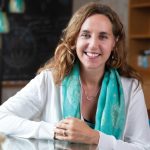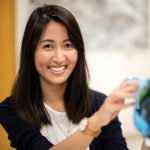In order for cancer to grow and spread, it has to evade detection by our immune cells, particularly specialized “killer” T cells. Professor Susan Kaech, Postdoctoral Fellow and first author Shihao Xu and colleagues have found that the environment inside tumors (the tumor microenvironment) contains an abundance of oxidized fat molecules, which, when ingested by the killer T cells, suppresses their ability to kill cancer cells. The discovery suggests new pathways for safeguarding the immune system’s ability to fight cancer by reducing the oxidative lipid damage in killer T cells, such as blocking a cellular fat transporter called CD36.
Read news releaseMetabolism
Research advances one step closer to stem cell therapy for type 1 diabetes
Type 1 diabetes, which arises when the pancreas doesn’t create enough insulin to control levels of glucose in the blood, is a disease that currently has no cure and is difficult for most patients to manage. Now, research led by Juan Carlos Izpisua Belmonte, and including co-first authors Postdoctoral Fellow Ronghui Li, Staff Researcher Hsin-Kai Liao and former Research Associate Haisong Liu, has led to a new way to create insulin-producing pancreatic beta cells from stem cells that is much more efficient than previous methods. When tested in a mouse model, these beta cells brought blood sugar levels under control within about two weeks and could someday lead to better treatments for people with type 1 diabetes.
Read news releaseParkinson’s, cancer, type 2 diabetes share a key element that drives disease
When cells are stressed, chemical alarms go off, setting in motion a flurry of activity that protects the cell’s most important players. During the rush, a protein called Parkin hurries to protect the mitochondria, the power stations that generate energy for the cell. Now, Salk Professor Reuben Shaw and colleagues have discovered a direct link between a master sensor of cell stress and Parkin itself. The same pathway is also tied to type 2 diabetes and cancer, which could open a new avenue for treating all three diseases.
Release news releaseFeatured Stories
 Building a More Resilient WorldThe world is facing an array of health-related crises: COVID-19 and other infectious diseases, climate change, neurodegenerative conditions, cancers and many more. To tackle these daunting challenges, the Institute is embarking on a philanthropic campaign to focus on resilience: the biological adaptability that mitigates the effects of aging, resists disease and restores global wellness.
Building a More Resilient WorldThe world is facing an array of health-related crises: COVID-19 and other infectious diseases, climate change, neurodegenerative conditions, cancers and many more. To tackle these daunting challenges, the Institute is embarking on a philanthropic campaign to focus on resilience: the biological adaptability that mitigates the effects of aging, resists disease and restores global wellness. Susan Kaech – How T cells rememberSalk Professor Susan Kaech, director of the NOMIS Center for Immunobiology and Microbial Pathogenesis, has made it her mission to gain a better understanding of how T cells form, how they exchange molecular signals with the surrounding tissue, and how we can use this knowledge to prevent or treat infections.
Susan Kaech – How T cells rememberSalk Professor Susan Kaech, director of the NOMIS Center for Immunobiology and Microbial Pathogenesis, has made it her mission to gain a better understanding of how T cells form, how they exchange molecular signals with the surrounding tissue, and how we can use this knowledge to prevent or treat infections.
 Carl Procko – Lessons from carnivorous plantsStaff Scientist Carl Procko studies Venus flytraps and their close relatives, Sundew plants, to gain insight into the ultra-fast biochemistry of plants and how they can sense touch. It doesn’t hurt that these bug-eating plants are a great way to get kids—and adults—interested in science.
Carl Procko – Lessons from carnivorous plantsStaff Scientist Carl Procko studies Venus flytraps and their close relatives, Sundew plants, to gain insight into the ultra-fast biochemistry of plants and how they can sense touch. It doesn’t hurt that these bug-eating plants are a great way to get kids—and adults—interested in science. Nuttida Rungratsameetaweemana – Drawing from memoriesNuttida Rungratsameetaweemana, a Salk postdoctoral researcher who studies neuroscience, was introduced to the perplexities of the brain at age 14 during a chance encounter in a hospital waiting room.
Nuttida Rungratsameetaweemana – Drawing from memoriesNuttida Rungratsameetaweemana, a Salk postdoctoral researcher who studies neuroscience, was introduced to the perplexities of the brain at age 14 during a chance encounter in a hospital waiting room.






















































